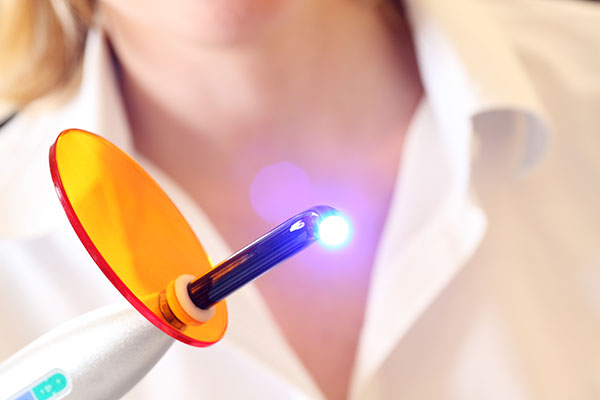What Is Laser Dentistry?

Laser dentistry involves the use of lasers to remove or transform hard or soft tissues during dental procedures. Although lasers were developed decades ago, its use in dentistry was not widespread until recently. In this article, you will learn about the types of lasers used in dentistry and the treatments where they may be applicable.
Types of Lasers
The lasers used in dentistry are soft tissue lasers and hard tissue lasers, and they both have unique applications.
Soft tissue lasers
According to the American Dental Association (ADA), the Food and Drug Administration in the United States has approved more than 20 applications of lasers in dentistry. The most common use of lasers is on soft tissues of the oral cavity such as the gums. The lasers used for such procedures include diode lasers, carbon dioxide laser, and Nd: YAG laser.
Lasers are useful for cutting and removing soft gum tissues, which makes them practical for dental procedures, such as gum reshaping for cosmetic purposes, and cutting down the gums around the tooth in a process called crown lengthening. In some cases, lasers are used to reduce gum tissue, loosen tight muscles in the mouth, treat cold sores or oral ulcers. Laser dentistry is also effective for periodontal disease treatment by eliminating the infected layer of the gum tissue surrounding the tooth and promoting regeneration of healthy gum tissues.
According to the American Association of Periodontology, it is hard to tell if laser dentistry treatment is more effective than conventional treatments of gum diseases. Laser dentistry treatment definitely has its advantages for soft tissues. Laser therapy reduces bleeding during and after surgeries, results in less discomfort (and therefore a minimal need for anesthesia), and minimizes swelling. In some cases, however, laser therapy may prolong healing and cause tissue discoloration.
Hard tissue lasers
Hard tissue lasers can cut through the hard tissues in the oral cavity, such as the teeth. This type includes the Er, CR: YSGG and Er: YAG lasers. These lasers are effective for removing tooth decay, prepare cavities for dental fillings, prep a tooth for root canal therapy, and abrade the tooth enamel to make fillings adhere to it.
Lasers created for hard-tissue procedures may minimize the need for sedation and lower the risk of overheating areas of the tooth such as the pulp (the tooth’s nerves). On the downside, hard tissue lasers can prolong the time required for treatment due to the accurate nature of laser cutting, and the results are sometimes inconsistent.
Applications of laser dentistry
Laser dentistry can be used in many dental treatments, including laser teeth whitening, placing dental restorations such as fillings and crowns, and detecting cavities. It is important to note that the ADA has not listed laser dentistry education as part of its accreditation requirements for dental education programs. This means that dentists must take additional training on using lasers through specialized programs or from manufacturers.
Final Note
Laser dentistry has its benefits when used for dental procedures. Patients who wish to try dental laser treatment will need to discuss with their dentist to know if the procedure is suitable for them.
Request an appointment here: https://familychoicedentistry.com or call Family Choice Dental at (505) 634-5657 for an appointment in our Albuquerque office.
Check out what others are saying about our services on Yelp: Read our Yelp reviews.
Related Posts
Patients who have wisdom teeth extraction enjoy having better dental health. This type of oral surgery is one of the most common procedures in a majority of dental clinics. Even so, some patients still suffer from complications from the surgery. If you want to find out what complications you may have after wisdom teeth extraction,…
Wisdom teeth tend to disrupt the balance of your oral environment. As these third molars develop, dental issues emerge. One of them is a dentigerous cyst. It is a fluid-filled sac that grows in the soft tissue and jawbone. Dentigerous cysts from wisdom teeth can carry dental problems. If you want to understand the dental…
Wisdom teeth extraction is common among teens and people in their early 20s. If you are around this age or have a child in this period of life, it is time to consider this procedure. Your dentist can evaluate you or your son or daughter to determine the appropriate next steps. These third molars often…
A TMJ dentist can help patients address pain, stiffness, and other complications linked to the temporomandibular joints. These joints near the ears are responsible for jaw movement, including speaking, chewing, and yawning. When dysfunction arises, it can significantly impact daily life. Recognizing the signs early and consulting the right dental professional is essential for effective…
